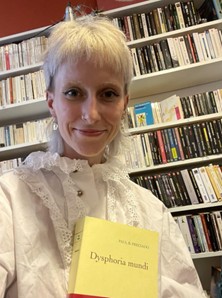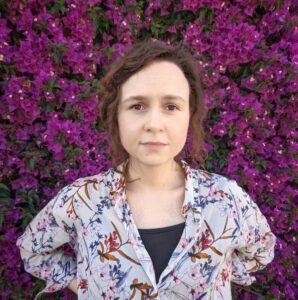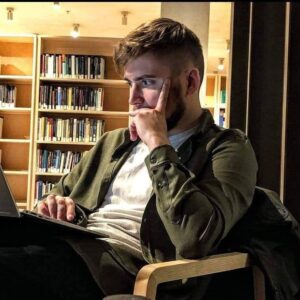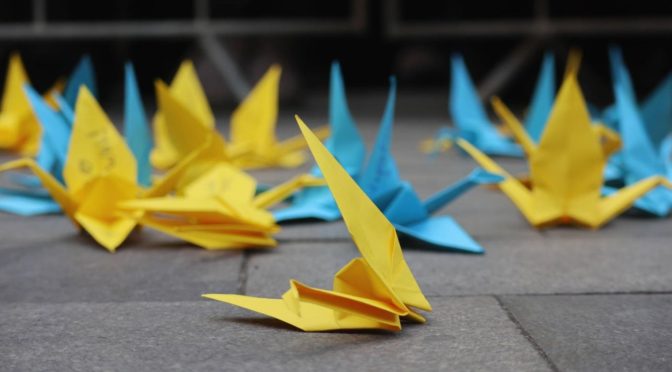“Gender of metabolism: enacting sexed bodies at the intersection of metabolic and sex hormones”
Research Area 2 – Norms and Transgressions
Contact: sabina.vassileva@soc.cas.cz
 Sabina Vassileva is a doctoral candidate at Charles University, Prague. Her PhD dissertation, entitled Gender of metabolism: enacting sexed bodies at the intersection of metabolic and sex hormones contributes to CEFRES research area 2.
Sabina Vassileva is a doctoral candidate at Charles University, Prague. Her PhD dissertation, entitled Gender of metabolism: enacting sexed bodies at the intersection of metabolic and sex hormones contributes to CEFRES research area 2.
My dissertation project draws on the growing recognition that the increasing prevalence of metabolic conditions such as diabetes and obesity is shaped by a complex interplay of biosocial factors. These include (epi)genetics, contemporary food environments saturated with ultra-processed foods, socioeconomic precarity, psychosocial distress, and as I argue gender norms, roles, and relations, including gendered reproductive labor. I am particularly interested in how bodies undergoing hormonal fluctuations face heightened risks of metabolic complications due to the intra-actions between declining estrogen and testosterone levels, glucose metabolism, insulin resistance, insulin sensitivity, microbiome shifts, and gendered norms of care. These dynamics remain underexplored, as biomedical research has historically privileged stabilized (male) bodies in clinical trials and research design.
In my dissertation, I explore how biosocial gendered relations shape metabolic health and diagnoses such as diabetes and obesity. I examine how gender is enacted in metabolic health along three axes: self-care practices, clinical care, and biomedical research. My focus is on the hormonal intra-actions between metabolic and sex steroid hormones. I draw on a Baradian material-semiotic framework and build on critical feminist anthropology of hormones, which has foregrounded how hormones not only carry gendered imaginaries but also function as technoscientific tools of sex regulation and bodily governance. While sex hormones such as estrogen and testosterone are often studied in isolation, their intra-actions with metabolic hormones like insulin or glucagon-like peptides remain largely sidelined in sociological research. To address this gap my work combines feminist anthropology of hormones with the notion of postindustrial metabolism that enables me to trace the mutual constitutions of gender and metabolism.
Methodologically, my PhD adopts a mixed-methods approach. I combine qualitative ethnography (semi-structured interviews and participant observation)—exploring embodied experiences and everyday practices of “doing metabolism” and “doing gender”—with critical discourse analysis of biomedical research on metabolism. My ethnographic partners include people with diabetes or obesity who undergo synthetic hormonal therapies: individuals navigating menopause, andropause, or gender-affirming hormone treatments. These bodily transitions are critical sites where gendered and metabolic regulation is negotiated. Through this research, I investigate how gendered metabolic norms are not only discursively repeated but also materially metabolized—becoming embedded in the design of metabolic technologies and medications used in care. For this purpose I use visual ethnography tools like hormonal mapping.
By tracing how gender is materially metabolized in bodies, care practices, and biomedical knowledge, my project offers a feminist rethinking of metabolism as a deeply gendered and politically regulated process. By focusing on hormonal intra-actions, the project foregrounds fluid and dynamic bodily processes and gives voice to bodies that are marginalized in biomedical research on metabolism and whose mutual shaping of sexed embodiments and living in gendered social relations is not sufficiently considered.
CV
Education
- from 2024 till present: PhD student, Sociology, Prague.
- 2021-2024: MA, Anthropology, Charles University, Prague
- 2017-2021: BA, Philosophy, Charles University, Prague.
Participation in research projects
- Since 2024: PhD-participant Technocultures of extended metabolism, [GA24-12497S], project based at the Czech Academy of Sciences.
- Since 2025: Junior researcher, Strategie AV21: Umělá inteligence pro vědu a společnost, Využití AI při managementu diabetu 1. typu, project based at the Czech Academy of Sciences.
- Since 2025: Junior researcher, Platform workers on the czech labour market, project based at the Czech Academy of Sciences
Recent academic activities (selected)
- June 2025: “Looped in within algorithms: A biosocial case study of a diabetic living with artificial pancreas,” paper presented at STS nordic conference, Stockholm, Sweden
- June 2025: “Unwriting design injustice: hormonal-algorithmic tinkering
- with open-source diabetes care technology,” paper presented at SIEF conference, Aberdeen, UK
- May, 2025: “Attending to risky attachments: a study of a DIY loop for diabetes care, paper presented at an academic workshop “STS concepts for the life as aftermath”, Munich, Germany
- March, 2025: “Queer metabolism: de/stabilizations of sex and gender binaries in biomedical research on gender affirming care and metabolism”, paper presented at STS HUB conference, Berlin, Germany
- November, 2024: “Opening the black box of algorithms,” invited lecture within undergraduate course “Společnost, technologie, tělenost,” Faculty of humanities, Charles University, Prague
- July, 2024: “Digital interfaces, real inequalities: exploring algorhitmic opacity in the platformised Czech delivery sector,” paper presented at EASA conference, Barcelona, Spain.
- July, 2024: “Chrononormativita z perspektivy genderu a politiky těla, “ invited lecture at Woods sympozium “Time at the tips of conifers”, Orlické mountains, Czech republic
- June, 2024: “More than Numbers: Health, Digitalization, and Bioethnography,” paper presented at the 15th MAYS Annual Meeting, Bologna, Italy.
Recent publications
- Borisova V., Vassileva S. 2025. „Caring for more-than-human metabolic health: Self-tracking technologies as tools of calculation and communication in obesity and type 1 diabetes care“. Archivio antropologico mediterraneo. 27 (1). http://journals.openedition.org/aam/10112
Canovas O, Conan L, Gille P, Martinez A, Miranda CK, Palmea K, Roubi T, Suarez M, Vassileva S & Aline Wiame, 2024. « La nature en guerre contre la vie. Une expérimentation d’écriture cyborg entre Guattari et Haraway », Sextant, 41. http://journals.openedition.org/sextant/11409




